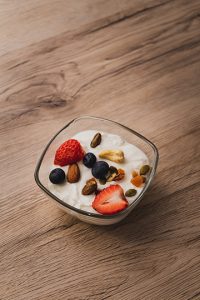 What are probiotics? Can you get all the probiotics from food that you need? Those are questions many people have when first hearing the terms. Probiotics are beneficial microbes, such as bacteria, fungi, and viruses that live in our bodies. The body has both harmful and beneficial microbes. The beneficial ones perform services that make our body healthier, such as aiding in food digestion, fighting off harmful microbes, and aiding in the creation of vitamins.
What are probiotics? Can you get all the probiotics from food that you need? Those are questions many people have when first hearing the terms. Probiotics are beneficial microbes, such as bacteria, fungi, and viruses that live in our bodies. The body has both harmful and beneficial microbes. The beneficial ones perform services that make our body healthier, such as aiding in food digestion, fighting off harmful microbes, and aiding in the creation of vitamins.
Probiotics need to survive in the intestines after they’re consumed.
To be a probiotic, it first has to survive the digestive process and survive in the gut. It’s an independent entity that isn’t an original part of the body. It must provide benefits and be safe to consume. The three most common types of probiotics sold in supplement form today include two bacteria, Lactobacillus and Bifidobacterium, both produce lactic acid, and the yeast Saccharomyces boulardii. You can increase all three microbes by eating food high in live bacteria, such as yogurt, kefir, sauerkraut, and other fermented foods.
You can eat your way to a healthier microbiome, but you have to look closely.
If you’re replenishing your microbiome with food, make sure the food contains live microbes. The manufacturing process often kills the very microbes that provide health benefits. If you’re buying yogurt, look for the words “active cultures” or “live” on the label. For sauerkraut, opt for unpasteurized, since pasteurization kills bacteria. Some pickles have probiotic benefits, but not the ones made with vinegar.
Keep your probiotics healthy by eating prebiotic foods.
Prebiotic foods feed the probiotics in your gut. Foods high in fiber are included in that group. They include fruits, vegetables, and legumes such as chickpeas, beans, raspberries, broccoli, and apples. Those foods increase the population of Bifidobacteria in humans. The fiber and beta-glucan in whole grains also help build friendly bacteria in the large intestines.
- If you can’t eat probiotic foods, supplementation is an option, especially if you have certain health issues, such as inflammatory diseases, IBS, diarrhea, allergies, and urinary tract infections.
- Some people shouldn’t take probiotic supplements. Those with a compromised immune system or on immune suppression therapy, SBO sufferers, or who have histamine intolerance, since some bacteria strains promote histamines, while others block it.
- Sugar impedes the growth of certain probiotics, often the ones found in healthy, lean individuals. Recent studies show it actually may cause certain bacteria to quit producing ROC that allows them to colonize in the intestines, so they get flushed out.
- A healthy balance of microbes can help with many illnesses and also aids in weight loss. Some can stop fat absorption, so you can flush the fat away. Other microbes make you build muscle or feel full sooner.
For more information, contact us today at Rising Fitness Gym
